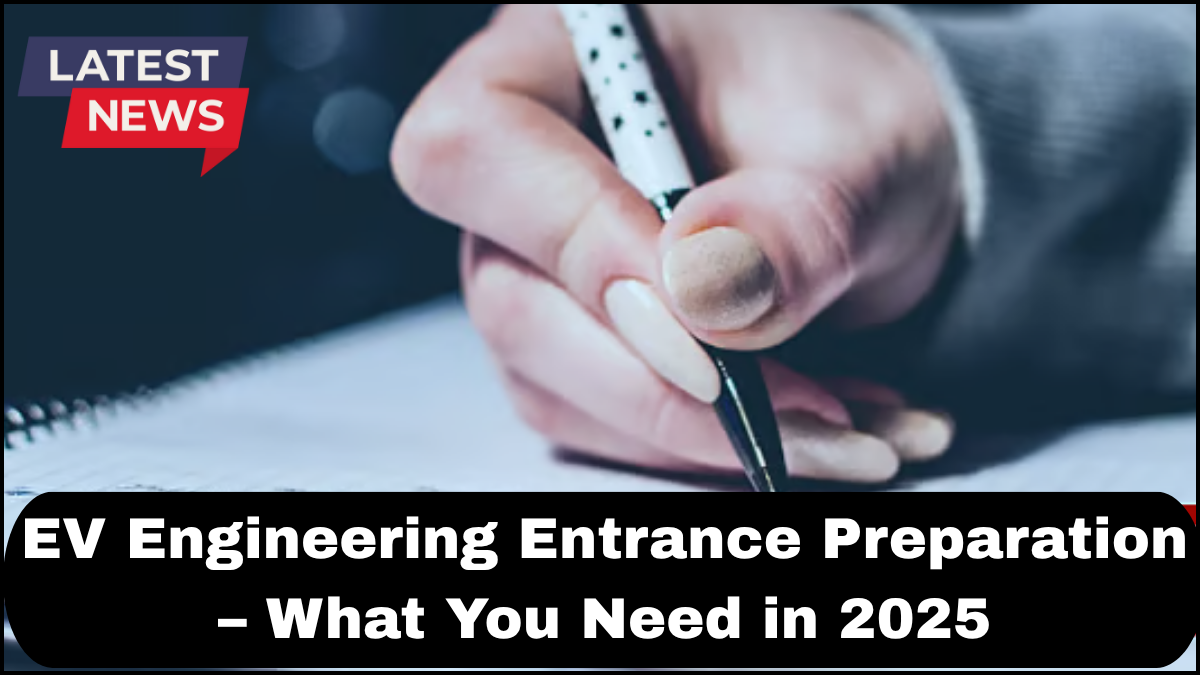Electric Vehicle (EV) technology is transforming the future of mobility, and engineering programs focused on EV innovation are now some of the most competitive in the world. With a surge in student interest and evolving entrance standards, preparing for a college entrance exam for EV engineering in 2025 demands a precise, strategic, and forward-thinking approach. Whether you’re aiming for a top-tier institution or a specialized program, understanding what it takes to excel is crucial.

Below is a comprehensive guide to effective EV Engineering Entrance Tips—everything you need to stand out and secure your seat.
Understand the Evolving Scope of EV Engineering
EV engineering isn’t just about batteries and motors. It blends multiple disciplines—mechanical, electrical, electronics, computer science, AI, and materials engineering. Entrance exams and curricula are now tailored to reflect this integration.
In 2025, candidates will need foundational knowledge in:
-
Physics (especially electromagnetism and thermodynamics)
-
Advanced mathematics (calculus, linear algebra, statistics)
-
Chemistry (battery technology, materials)
-
Programming basics (Python or MATLAB for simulations)
Colleges are also shifting focus toward sustainability, smart systems, and real-world problem-solving, so keep an eye on current trends in the EV ecosystem.
Master the Entrance Exam Structure
While each institution has its format, most college entrance exams for EV programs combine:
-
Subject-specific questions in Physics, Math, and Chemistry
-
Logical reasoning and analytical thinking
-
Basics of computer programming and data interpretation
-
Situational judgment or engineering aptitude sections
Research your target colleges thoroughly. For instance, institutes like IIT Madras (through interdisciplinary programs) and private universities like UPES or Amrita Vishwa Vidyapeetham offer specialized EV tracks. Some may include a design or innovation challenge in their selection process.
Key EV Engineering Entrance Tips for 2025
1. Start Early with a Customized Study Plan
Design your preparation plan around your strengths and weaknesses. Use the first few weeks to build a solid base and the rest of your time for problem-solving and mock tests. Prioritize consistency over volume.
2. Leverage Tech-Enabled Learning
Online platforms like NPTEL, Coursera, and Khan Academy now offer specific modules related to EV systems. Supplement your preparation with virtual labs and simulation tools like Simulink and Proteus to gain practical exposure.
3. Solve Topic-Wise and Mixed Practice Papers
Don’t just stick to previous year question papers. Use topic-wise tests to strengthen weak areas and full-length mock exams to build endurance. Focus on timing and accuracy.
4. Understand Real-World Applications
Top colleges look for candidates with a practical mindset. Follow industry trends—such as Tesla’s battery innovations, India’s EV policies, or smart charging infrastructure—to understand how textbook concepts apply on the ground.
5. Build Problem-Solving Skills
Many modern entrance exams include engineering puzzles or real-world scenarios. Practice open-ended questions that test how you think, not just what you know.
6. Attend EV Workshops and Seminars
These give you a hands-on edge and demonstrate genuine interest. Participation in design challenges like SAE India competitions or Formula Electric Student events can also give your application an advantage.
Don’t Neglect Soft Skills and Interviews
If your entrance includes an interview round, communication and passion are just as important as technical ability. Be ready to discuss your projects, career vision in the EV industry, and current challenges the sector faces (like battery recycling or EV grid integration).
Maintain a Healthy Balance
Burnout is a real threat. Stay consistent, sleep well, and take regular breaks. Join online forums or peer groups focused on EV engineering entrance preparation—community learning can make a big difference.
FAQs
What subjects should I focus on for EV Engineering entrance exams in 2025?
Focus on Physics, Mathematics, and Chemistry for core concepts. Additionally, strengthen your logical reasoning and programming fundamentals.
Are there any specific books or resources to prepare for EV engineering entrance?
Yes. Standard JEE-level books for PCM are a good base. Supplement them with EV-specific resources like “Electric Vehicle Technology Explained” by Larminie & Lowry and online lectures on battery systems, electric drives, and embedded systems.
Do I need to know programming to clear the college entrance exam for EV?
Basic programming (Python, C++) is increasingly being tested or expected, especially for institutions with a focus on embedded EV systems or AI in mobility.
Can attending EV-related seminars or projects boost my chances?
Absolutely. They showcase your genuine interest and can set you apart during interviews or selection rounds that go beyond standardized tests.
Which are some top colleges offering EV engineering in 2025?
IITs (through interdisciplinary or minor programs), NITs, VIT, UPES, SRM, and many international institutions like TU Delft and ETH Zurich have strong EV or sustainable mobility programs.
click here to learn more